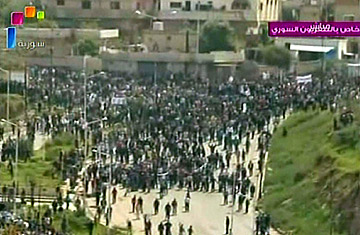
An image grab taken from footage broadcast by the Syrian state television allegedly shows scenes of clashes in the town of Dara'a on April 8, 2011.
(2 of 2)
"We can benefit from our previous experience with the Ikhwan and from the mistakes of the Tunisian and Egyptian regimes," it reads, referring to a savage 1982 campaign against the Muslim Brotherhood in Hama, in which tens of thousands were believed to have been killed. The now-ousted Tunisian and Egyptian regimes "didn't send in the military and presidential guard early and they allowed the media to cover everything that was happening. We will not allow events to reach a point where they pose a danger to the regime ... we must drag this out for several months to tire the protesters, the system will emerge stronger."
It speaks of the assassinations of members of "certain sects and tribes, or blowing up religious houses of worship in areas witnessing large demonstrations" to sow divisions among the protesters. It says the fear of fitna, or discord, should be planted in people's minds "to frighten the Christians and Druze of the Ikhwan, and along the coast to encourage the Alawites to defend their regime and their interests, by suggesting they are at risk from the Sunnis." The Assads are part of the minority Alawite sect, believed to comprise no more than 10% of the Syrian population, most of which is Sunni but with significant Christian and Druze elements.
Several ministers should also be sacrificed, according to the document, and exposed as corrupt, to suggest official responsiveness to calls for greater transparency. Well-known bogeymen will also be blamed, including the Saudis (specifically former ambassador to the U.S., Bandar bin Sultan) and anti-Syrian Lebanese including former Prime Minister Saad Hariri, son of billionaire Rafik Hariri who was killed in a car bomb initially widely blamed on Damascus. Saudi Arabia only recently mended its ties with Syria, a prominent Iranian ally in the region. The document goes on to say that tying the plot together, of course, are the "Zionists and Americans." (Syrian TV on Wednesday aired the "confessions" of three men who said they were paid and armed by an anti-Syrian Lebanese MP allied with Hariri to carry out attacks in Syria.)
Ayman Abdel-Nour, a prominent former Baathist-turned-dissident who edits the leading independent Syrian website all4syria.org from Dubai, says that news of the Saudi conspiracy led by Bandar bin Sultan is already all over the Syrian press. "This is the propaganda they are using to scare people," he says. He says the regime is trying to sow the fear of sectarian conflict, highlighting the experience of strife-torn Iraq to the east and Lebanon to the west. It is also trying to co-opt various sects by appeasing them, offering stateless Kurds citizenship and revoking the ban on niqabs — full face veils — in public institutions to placate conservative Sunnis. Still, it is the intelligence agencies who are at the fore, not Bashar al-Assad offering political solutions, and that is a problem because it doesn't suggest that the regime is taking the people's demands seriously, he adds.
Abdel-Nour says regime insiders have told him that Assad wants to calm the streets in order to implement a new model of governance, similar to the secular Turkish system but borrowing one key element from the Iranian: that the president will serve in a capacity similar to Iran's supreme guide, an elected position for life. Four political parties will be formed, so that "it will look like there is democracy in Syria ... but they will all be under the control of the national security council, which is headed by the president."
But the degree of cohesiveness within the regime is a matter of debate, especially if key figures like Farouk al-Sharaa start peeling away from it. Sharaa, who is from Dara'a, was reportedly furious that force was used against the city in the first week. He had reportedly given personal assurances to local leaders that no such thing would happen. The death of his cousin may further strain his longstanding ties to the regime he has given his life to.
